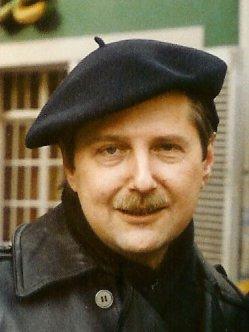Viktor Suslin facts for kids
Viktor Yevseyevich Suslin (Russian: Ви́ктор Евсе́евич Су́слин; born June 13, 1942, in Miass, Russia – died July 10, 2012, in Hamburg, Germany) was a talented Russian composer. He was known for his unique musical style. In 1975, he helped create a special music group called 'Astraea' with two other composers, Sofia Gubaidulina and Vyacheslav Artyomov. This group focused on making music up on the spot, which is called improvisation. Later, in 1981, Viktor Suslin moved to Germany.
Early Life and Music Studies
Viktor Suslin started learning piano when he was just four years old in 1946. He also began trying to write his own music around this time. From 1950 to 1961, he attended the Kharkiv Music High School. After that, he studied at the Kharkiv Conservatory for a year. There, he learned about composing music from Dimitri Klebanov and piano from V. Topilin.
He continued his music education from 1962 to 1966 at the Gnessin Institute in Moscow. During these years, he studied composition with Nikolay Peyko and piano with Anatoly Vedernikov.
Career and Challenges
After finishing his studies, Suslin worked as an editor at a publishing house called Muzyka in Moscow from 1966 to 1980. In 1967, he became a member of the Union of Soviet Composers. This was an important group for musicians in the Soviet Union.
In 1969, his piano sonata, which is a piece of music for piano, won an award at a Young Composers Competition. Just two years later, in 1971, his music was played outside of Russia for the very first time. This happened at a music festival in Royan, France.
From 1972 to 1975, Suslin also taught at the Moscow Conservatory. He taught a subject called instrumentation, which is about how to arrange music for different instruments. In 1975, he co-founded the ‘Astraea’ improvisation group. This group was special because they would create music together without planning it beforehand.
In 1979, some of Suslin's music was performed in cities like Paris, Cologne, and Venice. These performances happened without official permission from the Soviet authorities. Because of this, he was mentioned as one of the "Khrennikov's Seven" at a big meeting of the Union of Soviet Composers. This meant he was criticized for his music being played in the West without approval.
Life in Germany
In 1981, Viktor Suslin decided to move to West Germany. He continued his work in music there. From 1984, he worked as an editor at a music publishing company called Musikverlag Hans Sikorski in Hamburg. Later, in 2007, he became the director of another music publishing company, Musikverlag M. P. Belaieff.
Viktor Suslin was also good friends with another famous composer, Galina Ustvolskaya, especially later in her life. They wrote letters to each other. Suslin helped arrange an interview for her. It was during his time as an editor at Sikorski that the company started to publish Ustvolskaya's musical works.
Musical Works
Viktor Suslin wrote many different kinds of musical pieces throughout his life. Here are some of his notable works:
- Music for Children for piano (1961)
- Violin Sonata (1962)
- String Quartet (1963)
- Japanese Songs for baritone and piano (1964)
- Five pieces for piano (1965)
- Poem for orchestra (1966)
- Piano concerto (1966)
- Piano Sonata (1968)
- Violin Concerto (1969)
- Sinfonia piccolo for orchestra (1970)
- Trio-Sonata for flute, guitar and cello (1971)
- Three Choruses after Daniil Kharms (1972)
- Gioco Appassionato for 4 violas (1974)
- Patience for 2 pianos (1974)
- Mitternachtsmusik (Midnight Music) for violin, harpsichord and double bass (1977)
- Poco a poco II, Organ Sonata No.1 (1978)
- Terrarium for percussion ensemble (1978)
- Leb’ wohl for orchestra (1982)
- In My End is My Beginning, Organ Sonata No.2 (1983)
- Sonata per violoncello e percussione (1983)
- Chanson contre raison, Sonata for solo cello (1984)
- Sonata Capricciosa for viola and harpsichord (1986)
- Lamento for Organ (1989)
- Crossing Beyond for viola, cello and double bass (1990)
- Le deuil blanc (White Mourning) for bass flute, guitar, cello and percussions (1994)
- Cello Concerto (1996)
- Two Pieces for piano (1996)
- Hommage à "Hortus" by a Musicus for an ensemble of Renaissance instruments (1996)
- Morgendämmerungsmusik (Morning Twilight Music) for double bass (1997)
- Madrigal for two cellos (1998)
- Ton H for cello and piano (2001)
- Raga for double bass and organ (2006)
 | Valerie Thomas |
 | Frederick McKinley Jones |
 | George Edward Alcorn Jr. |
 | Thomas Mensah |


